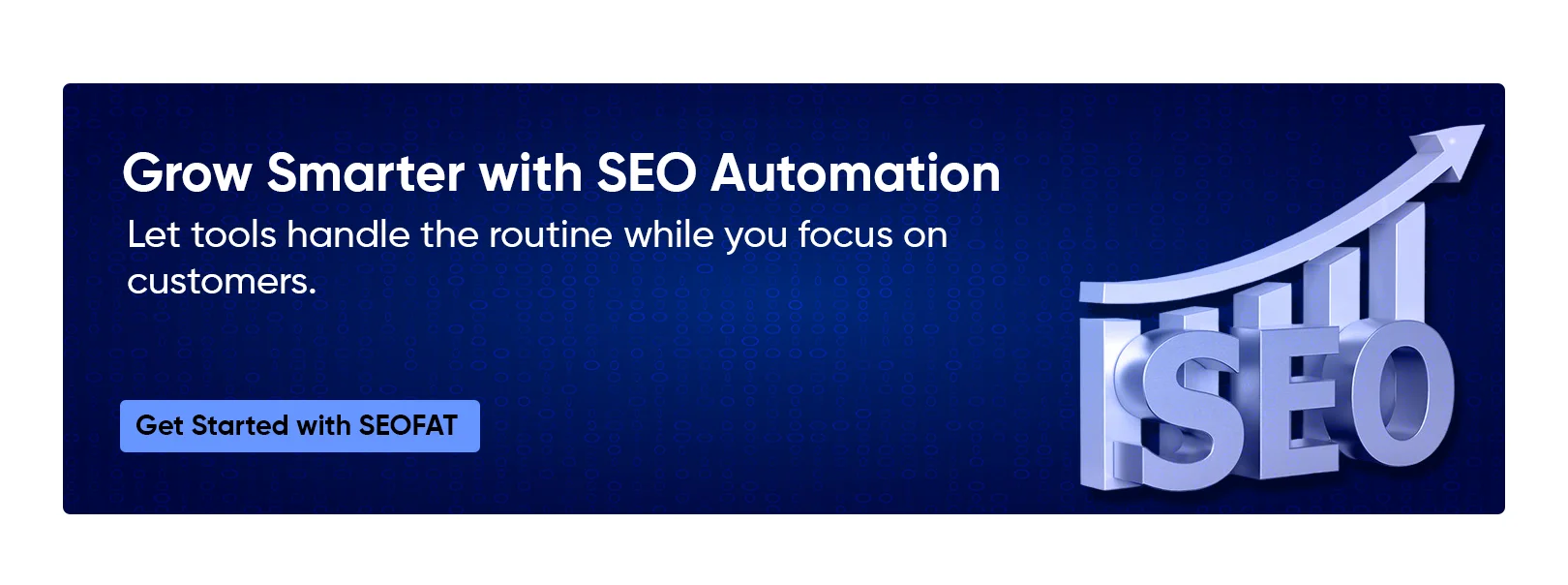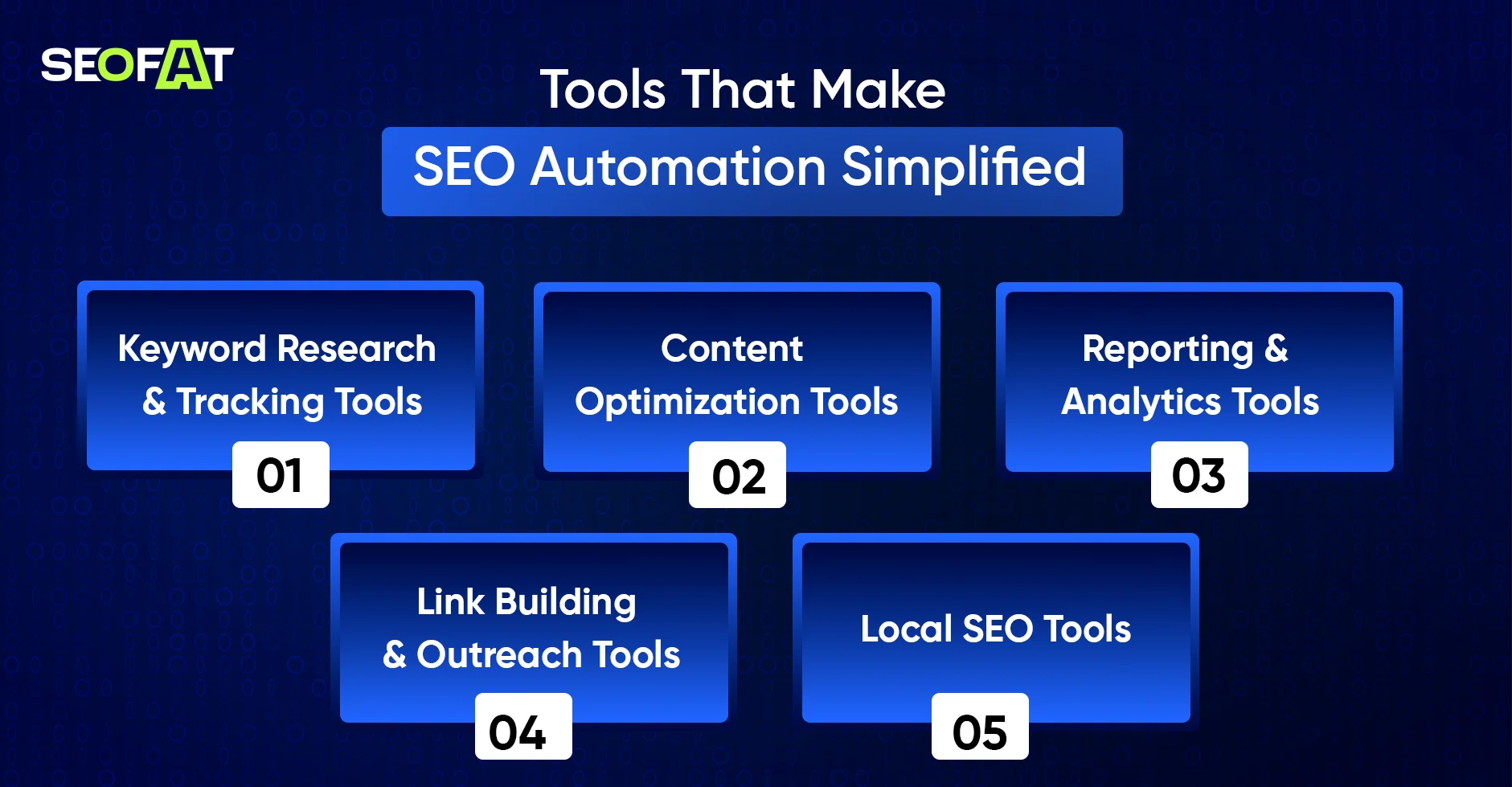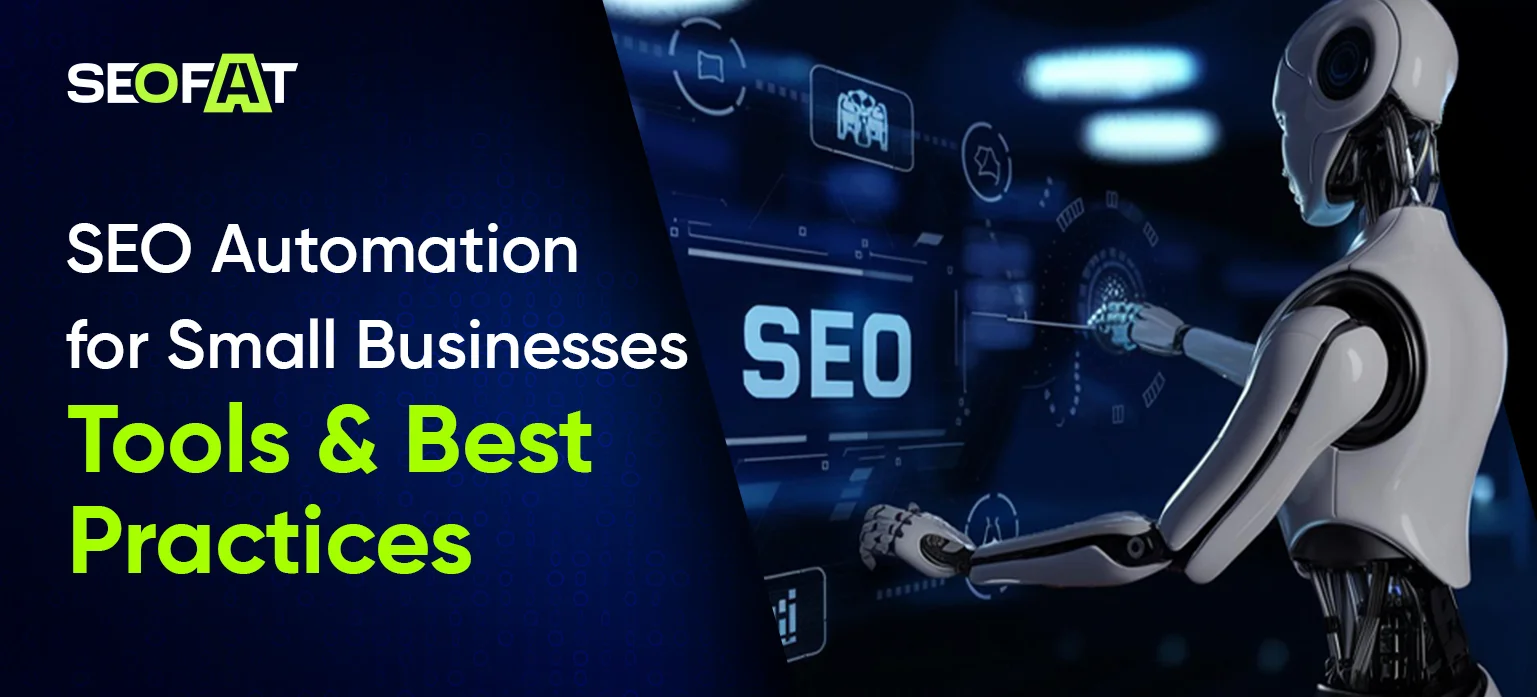Running a small business is challenging. It's nearly impossible to fit in time for marketing. Especially when you're dealing with customers, employees, and accounts. Not to mention, in today's online world, being visible isn't just important; it's essential.
One of the most effective ways to remain relevant and visible is through search engine optimization. But work on SEO is much like running on a treadmill. The ongoing necessity of monitoring keywords, posting content, analyzing analytics, and speeding up technical fixes becomes a full-time job.
That's where the frustration begins. Owners invest time and effort in SEO, but often see little visible progress. Competitors with deeper pockets appear to overwhelm search pages, while small business owners struggle to keep up.
This is where SEO Automation for small businesses becomes so essential. By allowing tools to take on the monotonous work, small teams can utilize their time more effectively. It helps maintain consistency and focus on the bigger picture and business growth. That’s not all! Continue reading the blog to learn more about SEO Automation for Small Businesses. 
What is SEO Automation?
SEO automation applies tools and technology to repetitive tasks. It does not replace human intelligence; it simply addresses the drudgery of manual work.
The following are what automation typically addresses:
- Keyword monitoring: Tracking ranking changes on a daily or weekly basis.
- Content optimization: Recommending changes based on competitors and intent.
- Technical audits: Detecting broken links, slow pages, or missing tags.
- Reporting: Creating automated dashboards that update without manual work.
- Link outreach support: Organizing outreach campaigns and tracking responses.
Imagine a fitness studio. The owner wants to rank for “yoga classes in Miami.” Instead of checking rankings manually every week, an automated tool sends updates, flags competitor activity, and shows how traffic is trending. That’s hours saved each month.
Why SEO Automation for Small Businesses is Important
SEO is not a tick box. It is a long-term strategy built on authority and trust. Google encourages sites that are regularly updated, free of errors, and user-friendly.
As a small business owner, you are doing it all. Consistency is tough to maintain. That is where automation comes in:
- It saves time: Late nights are no longer spent working, fixing broken links, or pasting and copying from documents into spreadsheets.
- Leveling the playing field: Small business competition with massive corporations is not possible without replicating their budget.
- Restores focus: Business owners don't have to chase every SEO task. They can simply focus on reaching customers and establishing relationships.
Example: Consider a neighborhood bakery. The owner's day is already full of baking, staffing, and stocking shelves. SEO falls by the wayside. With AI Digital Marketing Services, tasks like writing optimized content, tracking keywords like "best bakery near me," or even reporting on online visibility can be automated in the background. The owner then receives the value of SEO without losing focus on the business.
 SEO automation is equivalent to having an assistant who never tires. For small businesses, the real value is choosing tools that save time and bring clarity, not confusion. The most sage policy is to start small, use what fixes your immediate issues, and expand from there as your business grows.
SEO automation is equivalent to having an assistant who never tires. For small businesses, the real value is choosing tools that save time and bring clarity, not confusion. The most sage policy is to start small, use what fixes your immediate issues, and expand from there as your business grows.
Keyword Research & Tracking Tools
Identifying the correct keywords is the key to SEO, but manually tracking them is exhausting. Automation tools make this easier and maintain uniformity.
- Serpstat: A lesser-known tool offering keyword research, site audit, and competitor analysis at a lower cost than most market giants.
- Wincher: Lightweight rank-tracking tool. Perfect for business owners who require daily updates without super-complicated dashboards.
- Google Search Console (Well-Known): The essential free choice. Displays which search terms drive traffic and warns you of site glitches.
Example: A small bakery might use Keyword Tracker to prioritize "custom birthday cakes near me" over wasting efforts on general terms such as "cakes." Afterward, using Google Search Console, they can observe how those terms actually perform during actual searches.
Content Optimization Tools
Quality content resonates with humans, but automation tools make sure it also complies with SEO.
- NeuronWriter: An emerging content tool that performs semantic analysis to suggest terms competitors are ranking for.
- Frase: Assists in structuring outlines and creating SEO-based briefs, which saves planning time.
- Yoast SEO: The most popular WordPress plugin to optimize on-page, ideal for quick reading and keyword tests.
Reporting & Analytics Tools
Numbers only work if they're understandable. Auto dashboards enable businesses to view progress without an analyst.
- Matomo: Open-source analytics software that allows you to own your data. Best for businesses that value privacy.
- Clicky: Includes live analytics, showing exactly who's on your site right now and what they're viewing.
- Google Analytics: Even after all this time, it is still one of the greatest free tools for monitoring visitors and conversions.
Example: A local clothing store may use Dashboards to monitor whether blog entries about "summer fashion" generate sales.
Link Building & Outreach Tools
Outreach takes time, but the proper software can automate most of it.
- Respona: A combination of PR outreach and link building. Ideal for small businesses seeking media coverage and backlinks.
- NinjaOutreach: Assists in reaching influencers and bloggers at scale, but remains simpler to use than business software.
- BuzzStream: A reliable choice for handling outreach campaigns.
Example: A coffee roaster may utilize Respona to pitch to local food magazines.
Local SEO Tools
Local companies succeed or fail depending on their Google Maps ranking and reviews. Automation simplifies managing listings and reviews.
- Synup: Creates and maintains business listings in directories. It includes Yelp, Bing, and TripAdvisor.
- Moz Local: A household name for syncing your business information to the big platforms.
Use case: A local gym can use local SEO tools to view new Google reviews in real-time and respond promptly.
Best Practices for Applying SEO Automation
When applying SEO automation for small businesses, the goal is to save time while keeping strategy human-led. You can automate repetitiveness, but not creativity. Apply tools to tracking, technical audits, and reporting. Leave strategy and storytelling to humans.
- Leave dashboards simple: Prioritize three: traffic, conversions, and rankings.
- Set reminders: Most tools will alert you when rankings decline or site issues occur. This prevents problems from accumulating.
- Check regularly: Monitor the data in a week or a month to ensure it continues to support your objectives.
- Combine with content planning: Tools can optimize existing pages, but you still need new blogs, service releases, and informative assets.
- Don't clog up with tools: Start with two or three must-haves. Too many tools lead to confusion and wasted money.
How SEOFAT Empowers Small Businesses With Automation
 Selecting, installing, and operating automation tools can be daunting, especially for marketers without a marketing education. That's where SEOFAT enters the picture.
We help small businesses to:
Selecting, installing, and operating automation tools can be daunting, especially for marketers without a marketing education. That's where SEOFAT enters the picture.
We help small businesses to:
- Select the right automation tools depending on company size and niche.
- Automate reports that indicate which keywords are driving traffic to your site.
- Optimize content based on intent and competitors.
- Identify broken links, slow pages, or missing tags.
- Build automated dashboards that refresh without human effort.
For instance, a medical clinic can be concerned about compliance when executing SEO. SEOFAT makes sure content optimization happens with HIPAA-compliant processes in place, and automated reports monitor patient queries via the site.
Conclusion
SEO is one way to describe a marathon, not a sprint, and that's correct. However, small businesses often lack the time or resources to run that marathon manually. That is where automation comes in.
SEO Automation for Small Businesses, combined with AI & GPT Services, helps owners do what they're best at delivering to customers without losing visibility on Google. Tools handle repetitive tasks, while humans focus on strategic and creative work.
And with the appropriate partner, it gets even easier. SEOFAT provides small businesses with automation power, bridging intelligent technology with decades of experience.
For companies looking to expand online without diverting attention from their everyday business, SEOFAT offers a solid way forward. 














